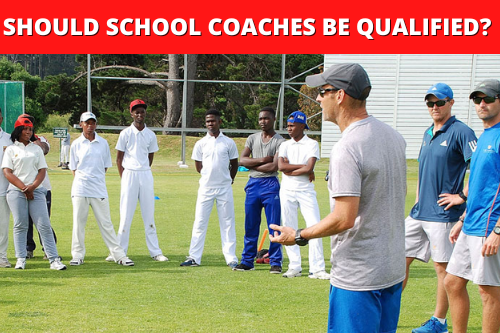Should a coach certification be mandatory in our elite sporting schools? By Gary Kirsten
I conducted a survey, recently, of 22 of South Africa’s most elite cricket schools to find out the level of coaching qualification at this level. The results were staggering. Of the 367 people coaching cricket teams, 203 had no formal coaching qualification whatsoever. Of the remaining coaches:
- 79 had a CSA Level 1 certificate
- 53 had a CSA Level 2 certificate
- 30 had a Level 3 certificate
- Only 2 had a Level 4 certificate
77% of School Coaches Unqualified
Currently, the CSA Level 1 focuses on the batting, bowling and fielding fundamentals. It certainly does not adequately qualify anyone to coach an A- or B-side school cricket team. If we included the 79 Level 1’s as insufficiently qualified, then an astounding 77% of coaches working in our elite school cricket system are not sufficiently qualified to coach a cricket team.
Of the 164 qualified coaches surveyed, 75 of them were certified more than 10 years ago. These are compelling statistics that suggest coach education compliance is not a priority within South Africa’s top school sport’ ecosystem.
South Africa Blessed with Incredible School Sports
South Africa is recognised for a strong and well-organised school sports’ curriculum, with a long history of derbies and rivalries going back many years. One can simply pop over to one of these schools on a Saturday morning to watch a very competitive sporting event taking place.
This is thanks, largely, to ongoing rivalries and the effort the schools make to maintain a strong sporting programme that attracts talented young players. Many of these schools have appointed high-profile and ex-first-class players to run their sports’ programmes in an effort to create a professional and high-performance environment.
I have had many conversations with players and coaches from different parts of the world. Their experiences of sport at school are vastly different to what many young South Africans experience, where we’re blessed with an incredible school sports’ ecosystem.
Time Come For Schools to Require Coaching Qualifications?
This being said, as a parent at one of these elite sports’ schools, the least I would expect is for the school to adhere to some form of coaching compliance. At the very minimum, I would expect every coach to have an adequate qualification to coach and mentor my child. Unfortunately, this is not the case.
The world we live in is filled with examples of coach-player relationships that have been wholly inappropriate and at times abusive. This unregulated environment is also affected by unqualified, unfiltered and often detrimental coaching interventions, often leaving teenagers with no choice but to comply.
Has the time not come for schools to regulate their sports’ environment by ensuring coaching qualification and compliance? As a professional coach in the UK for the last two years, I have had to complete a child safety certificate as well as produce a police clearance certificate. This ensures I meet a standard of compliance in line with the requirements to work with young people.
Unqualified Coaches Can make a Disastrous impact
The positive influence a coach can have on a young player in his/her development as a human being is as important as their academic progress. Many find their identity and sense of self-worth through their achievements on the sports’ field, but like any environment, mentoring and leadership are needed to assist them in reaching their next level of development.
Teenagers’ lives are being constantly shaped and influenced by the people around them. A negative influence, comment or intervention by an unqualified practitioner can potentially leave a lasting – and sometimes disastrous – impact on the lives of these young people.
I am fully aware of the budget challenges schools face when it comes to teacher and coach training. I do, however, appeal to all South African school leaders who believe that sport plays a crucial role in the development of a young person to ensure all coaches are qualified, and become an agent for a stronger regulatory environment.
It’s in the best interests of the school, of the sport, but most importantly, of our children.
More Articles by Gary Kirsten:

